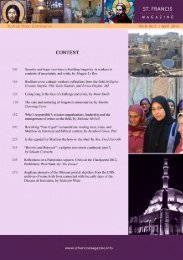download the pdf - St.Francis Magazine
download the pdf - St.Francis Magazine
download the pdf - St.Francis Magazine
You also want an ePaper? Increase the reach of your titles
YUMPU automatically turns print PDFs into web optimized ePapers that Google loves.
<strong>St</strong> <strong>Francis</strong> <strong>Magazine</strong> Vol 8, No 4 | August 2012<br />
fur<strong>the</strong>r complexity is added to <strong>the</strong> model to account for fluid, multiple,<br />
and hybrid identities.<br />
I believe that understandings of identity derived from <strong>the</strong> social<br />
sciences need not conflict with those drawn from biblical <strong>the</strong>ology.<br />
The Bible brings an added dimension of humans in relation to <strong>the</strong>ir<br />
Creator, but this links directly with <strong>the</strong>ir core identity, while biblical<br />
descriptions of people in <strong>the</strong>ir communities are compatible with notions<br />
of social and collective identity. Thus, at least so far as analysis<br />
of human phenomena is concerned, I have not till now found a clash<br />
between biblical and sociological perspectives. I do realise however,<br />
that while <strong>the</strong> social sciences aspire merely to describe and analyze,<br />
<strong>the</strong> scriptures go fur<strong>the</strong>r by also offering instruction and guidance.<br />
7.2. Suggestions<br />
My studies in identity for Christ’s followers from Muslim background<br />
are ongoing, and my conclusions as yet provisional. At this<br />
stage I venture <strong>the</strong> following suggestions:<br />
- In <strong>the</strong> realm of core identity, true disciples of Christ will know <strong>the</strong>mselves<br />
to be securely and unambiguously rooted in him (whatever<br />
terminology <strong>the</strong>y use for that), will seek to prioritize his values over<br />
all rival values, and will increasingly demonstrate this in <strong>the</strong>ir speech<br />
and behaviour;<br />
- In <strong>the</strong> realm of social identity, most believers will relate to both old<br />
and new communities simultaneously even if not equally. To expect<br />
<strong>the</strong>m to retain just one social identity, whe<strong>the</strong>r Muslim or Christian,<br />
is nei<strong>the</strong>r realistic nor biblically appropriate;<br />
- In <strong>the</strong> realm of collective identity, however, dual belonging is not<br />
normally possible. Whe<strong>the</strong>r <strong>the</strong>y like it or not believers from Muslim<br />
background may be forced into one label or <strong>the</strong> o<strong>the</strong>r, “Muslim”<br />
or “Christian”, until <strong>the</strong>ir numbers grow sufficiently for <strong>the</strong>m to form<br />
a new collective identity of <strong>the</strong>ir own. They know <strong>the</strong>ir own available<br />
options and should be given space to try to find a way around <strong>the</strong><br />
formidable constraints of such issues as identity cards and community<br />
labels;<br />
<strong>St</strong> <strong>Francis</strong> <strong>Magazine</strong> is a publication of Interserve and Arab Vision 564







![Reflections on Surah Fatiha and the Lord's Prayer[1] - St.Francis ...](https://img.yumpu.com/49377951/1/184x260/reflections-on-surah-fatiha-and-the-lords-prayer1-stfrancis-.jpg?quality=85)









